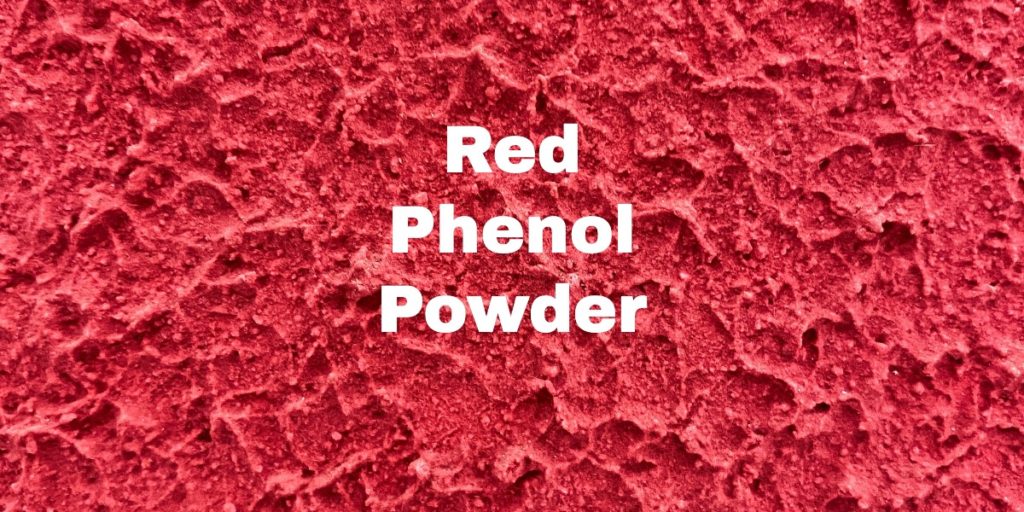Red Phenol Powder: Superfood, Benefits, and Foods That Contain It
If you read our article on “How To Reset Your Gut” based on Joel Greene’s protocol in his book “The Immunity Code: The New Paradigm for Immune Centric Health and Radical Anti-Aging” it calls for the use of red phenol powder. I bought a version from Organifi without doing too much research since I trust that brand. But I wanted to do a deeper dive into its health benefits, and whether I should add it to my daily routine. The post below incorporates what I learned during my research.
What is Red Phenol Powder?
You might be wondering, “What the heck is red phenol powder?” Red phenol powder is a compound derived from natural sources, such as fruits, vegetables, and plant-based foods. A quality supplement will have a potent blend of antioxidants and bioactive compounds, which can help support your overall health.
Historically, red phenol powder has been used in traditional medicine across various cultures. But, it’s only recently that it has caught the attention of modern health enthusiasts. Let’s move on to the potential health benefits of red phenol supplements (often called red superfoods).

Health Benefits of Red Phenol Powder
Antioxidant Properties
We consistently hear about the importance of antioxidants in our diet, right? Well, red phenol powder is a mega dose of these magical molecules. Its antioxidant properties help reduce oxidative stress and support cellular health, which is excellent news for those of us who want to stay young and vibrant.
Anti-inflammatory Effects
Inflammation is the root of all evil. Alright, that may be taking it too far, but chronic inflammation can wreak havoc on our bodies. Red phenol powder’s anti-inflammatory effects can alleviate inflammation and promote joint health, making it a valuable addition to a daily routine.
Cardiovascular Health
As someone who’s always on the lookout for ways to optimize my heart health, I noted research indicating red phenol powder’s potential benefits in this department. It has been shown to improve blood circulation and support healthy cholesterol levels.
Cognitive Function
Do you ever feel like your brain is running on an old, rusty hamster wheel? Red phenol powder might just be the oil your cognitive gears need. Research suggests that it can enhance memory and concentration while protecting against neurodegenerative diseases.
However, findings from individual studies included in this systematic review suggest that polyphenol-rich supplementation may improve some cognitive and brain functions in older adults.
The Effect of (Poly)phenol-Rich Interventions on Cognitive Functions and Neuroprotective Measures in Healthy Aging Adults: A Systematic Review and Meta-Analysis
Immune System Support
It’s more important than ever to have a strong immune system. Red phenol powder can help with that, as well. By strengthening your immunity and fighting off infections and illnesses, this supplement acts as a nice cover-all.
They can modulate multiple immune system processes and reduce the burden of various diseases such as IBD, allergies and autoimmune disorders. In addition to their demonstrated antioxidant qualities, polyphenols have broad health-promoting effects, due to their ability to modulate inflammation and immune responses.
Immunomodulatory Effects of Dietary Polyphenols
How to Incorporate Red Superfoods into Your Diet
Now that we’ve covered the benefits of this compound, let’s talk about how to get it into your body.
Recommended Dosage and Frequency
As with any supplement, the key is to find the right dosage and frequency that works for you. While there’s no one-size-fits-all answer, a good starting point is to follow the manufacturer’s recommendations on the packaging. Of course, it’s always a good idea to consult with your healthcare professional before making any changes to your supplement regimen.
Forms of Red Phenol Powder Supplements
Red phenol powder comes in various forms to suit your preferences:
- Capsules: Easy to swallow and convenient for on-the-go use.
- Tablets: Another straightforward option for those who prefer a more solid form.
- Powder: Ideal for mixing into your favorite drinks and recipes.
Creative Ways to Consume Red Phenol Powder
If you’re like me and enjoy experimenting in the kitchen, you’ll love these ideas for incorporating red phenol powder into your meals:
- Smoothies: Blend red phenol powder with your favorite fruits, veggies, and protein powder for a nutrient-packed drink.
- Baking recipes: Add a scoop of red phenol powder to your next batch of muffins, pancakes, or cookies for an antioxidant boost.
- Beverages: Stir a spoonful of red phenol powder into your morning coffee, tea, or even a glass of water.
Ultimate Polyphenol Video Guide From Dr. Gundry MD
This video from Dr. Steven Gundry, MD, best known for his work as a cardiothoracic surgeon and heart surgeon, is a primer on everything polyphenol-related. He dives into what they are, identifies the foods rich in them, and guides you on incorporating them into your diet. He also tackles questions about polyphenols and their benefits.
Sources Of Phenolic Compounds in Food
Phenols, also known as phenolic compounds, are naturally occurring antioxidants found in many fruits. These compounds contribute to the fruits’ color, flavor, and health-promoting properties. Here’s a list of fruits that are excellent sources of phenols:
- Berries: Blueberries, blackberries, strawberries, raspberries, and cranberries are rich in phenolic compounds, particularly anthocyanins, and flavonols, which contribute to their vibrant colors and powerful antioxidant properties.
- Grapes: Red and purple grapes contain high levels of phenolic compounds, including resveratrol, quercetin, and catechins. These compounds have been linked to various health benefits, such as heart health and anti-inflammatory effects.
- Apples: Rich in phenolic compounds like quercetin, catechin, and chlorogenic acid, apples offer antioxidant and anti-inflammatory benefits. The old adage, “An apple a day keeps the doctor away,” may indeed have some truth to it.
- Plums and prunes: These fruits are rich in phenolic compounds, including chlorogenic acid, anthocyanins, and neochlorogenic acid. Their antioxidant properties have been linked to various health benefits, such as supporting digestion and bone health.
- Cherries: Both sweet and tart cherries contain high levels of anthocyanins and other phenolic compounds, which contribute to their anti-inflammatory and antioxidant effects.
- Citrus fruits: Oranges, lemons, grapefruits, and limes are rich in phenolic compounds, such as flavanones, hesperidin, and naringin. These compounds provide various health benefits, including immune support and heart health.
- Pomegranates: This fruit is a powerhouse of phenolic compounds, including ellagitannins and anthocyanins, which contribute to its antioxidant, anti-inflammatory, and heart health-promoting properties.
- Figs: Figs contain phenolic compounds like rutin, catechin, and gallic acid, which contribute to their antioxidant and anti-inflammatory effects.

Keep in mind that the phenolic content in fruits can vary depending on factors such as ripeness, storage, and processing. Consuming a variety of these fruits can help you maximize your intake of phenolic compounds and their associated health benefits.
Safety and Precautions
As fantastic as red phenol powder sounds, it’s essential to consider potential side effects and precautions.
Possible Side Effects
While generally considered safe, some individuals may experience mild side effects such as upset stomach, nausea, or headaches. If you notice any adverse reactions, it’s best to discontinue use and consult with a healthcare professional.
Interactions with Medications and Other Supplements
Red phenol powder may interact with certain medications or supplements. To avoid any potential issues, consult your healthcare provider before adding it to your routine, especially if you’re currently taking any prescription medications.
Pre-existing Conditions and Contraindications
Individuals with pre-existing medical conditions or specific contraindications should exercise caution when using red phenol powder. Always speak with a healthcare professional before starting any new supplement.
Choosing a High-Quality Red Phenol Powder Supplement
Now that you’re itching to try red phenol powder, how do you find a high-quality product? Consider these factors:
- Purity and potency: Look for supplements with minimal additives and a high concentration of active ingredients.
- Manufacturing practices: Choose products from companies that adhere to strict manufacturing standards, such as GMP certification.
- Third-party testing and certifications: Opt for supplements that have been tested and certified by reputable third-party organizations, ensuring quality and safety.
I tend to use a version from Organifi when I do my yearly gut reset, but with these guidelines in mind, you’ll be well-equipped to make an informed decision.
Conclusion
Red phenol powder is an intriguing supplement with interesting potential health benefits, ranging from antioxidant properties to immune system support. As always, remember to consult with a healthcare professional before making any changes to your diet or supplement routine. Remember, supplements should not replace a balanced diet and a healthy lifestyle.
Have you tried red phenol powder? I’d love to hear about your experiences and comments.
Troy Wallace
Troy Wallace is Certified Basketball Speed Specialist and shares his experiences in trying to stay as healthy as possible to stay on the court. He is active in coaching youth basketball in YMCA, Team Work Sports Nebraska, and, currently, in the Jr. Warriors program in Omaha, NE. Visit Troy's Full Author Bio Page or email him directly.
Meaningful conversations happening daily about training, recovery, and injury-specific rehabilitation as well as sport-specific discussions on playing, coaching and refereeing your favorite sport. We welcome experts and those with curious minds seeking answers.
Join The Stay On The Court Community!